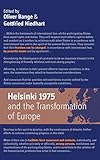Helsinki 1975 and the Transformation of Europe / ed. by Gottfried Niedhart, Oliver Bange.
Material type: TextPublisher: New York ; Oxford : Berghahn Books, [2008]Copyright date: ©2008Description: 1 online resource (216 p.)Content type:
TextPublisher: New York ; Oxford : Berghahn Books, [2008]Copyright date: ©2008Description: 1 online resource (216 p.)Content type: - 9781845454913
- 9780857450166
- 327.4304709046
- online - DeGruyter
| Item type | Current library | Call number | URL | Status | Notes | Barcode | |
|---|---|---|---|---|---|---|---|
 eBook
eBook
|
Biblioteca "Angelicum" Pont. Univ. S.Tommaso d'Aquino Nuvola online | online - DeGruyter (Browse shelf(Opens below)) | Online access | Not for loan (Accesso limitato) | Accesso per gli utenti autorizzati / Access for authorized users | (dgr)9780857450166 |
Frontmatter -- Contents -- Preface -- Abbreviations -- Introduction -- 1 – An Intricate Web: Ostpolitik, the European Security System and German Unification -- 2 – Peaceful Change of Frontiers as a Crucial Element in the West German Strategy of Transformation -- 3 – France and the German Question in the Context of Ostpolitik and the CSCE, 1969–1974 -- 4 – Transformation or Status Quo: The Conflict of Stratagems in Washington over the Meaning and Purpose of the CSCE and MBFR, 1969–1973 -- 5 – Britain, the German Question and the Transformation of Europe: From Ostpolitik to the Helsinki Conference, 1963–1975 -- 6 – Finlandisation in Reverse: The CSCE and the Rise and Fall of Economic Détente, 1968–1975 -- 7 – The Warsaw Pact, the German Question and the Birth of the CSCE Process, 1961–1970 -- 8 – Romania, Ostpolitik and the CSCE, 1967–1975 -- 9 – Preserving the Status Quo or Promoting Change: The Role of the CSCE in the Perception of Polish Authorities -- 10 – Bulgaria, Balkan Diplomacy and the Road to Helsinki -- 11 – Unintended Consequences: Soviet Interests, Expectations and Reactions to the Helsinki Final Act -- Archival Sources -- Archival Sources -- Contributors -- Index
restricted access online access with authorization star
http://purl.org/coar/access_right/c_16ec
It was in Europe that the Cold War reached a decisive turning point in the 1960s, leading to the era of détente. The Conference on Security and Cooperation in Europe (CSCE), with its Final Act in Helsinki in August 1975, led to a rapprochement between East and West in the fields of security, economy and culture. This volume offers a pilot study in what the authors perceive as the key issues within this process: an understanding over the ‘German problem’ (balancing the recognition of the post-war territorial status quo against a formula for the eventuality of a peaceful change of frontiers) and the Western strategy of transformation through a multiplication of contacts between the two blocs. Both of these arguments emerged from the findings of an international research project on ‘Détente and CSCE in Europe, 1966-1975’, funded by the Volkswagen Stiftung and headed by the two editors.
Mode of access: Internet via World Wide Web.
In English.
Description based on online resource; title from PDF title page (publisher's Web site, viewed 25. Jun 2024)


